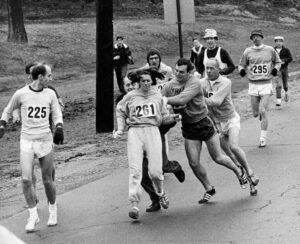by thecowl.opinion on April 27, 2017
Opinion

by Sarah Kelley ’18
Opinion Staff
On a rainy day in April 1967, 20-year-old Kathrine Switzer became the first woman to ever officially run the Boston Marathon. Having registered under the gender neutral name K.V.—the same name she used to sign all of her college assignments—Switzer knew that this was a race women were not allowed to run.
But Switzer ran it anyway. Even after being attacked by the race director, John Semple, two miles into the course, she persevered. Despite his attempts to stop her, Switzer crossed the finish line in four hours and 20 minutes. But on that day, wearing the now widely-recognized bib number 261, Switzer achieved much more than a respectable marathon time.
With every step she took from Hopkinton to Boston, Switzer proved to everyone that a woman could go the distance in the male-dominated tradition. She broke the commonly held stereotypes of her time regarding female athletic abilities. And with every stride, she empowered women throughout the world to achieve their potential in all areas of life, from running and beyond.
Fifty years later, 70-year-old Switzer again competed in this year’s Boston Marathon, celebrating the anniversary of that symbolic and powerful race. And even though half a century has passed since that fateful run, and many major achievements in the women’s rights movement have been accomplished since then, Switzer’s message of equality and women’s rights still is just as pressing and important as it was in 1967, especially in light of our current national political environment.
Despite the major advancements, the Women’s Rights Movement has achieved since the time of Switzer’s race—from the running world to our own national political arena and beyond—Switzer’s return to the Boston Marathon reminds us that we must continue running for women’s rights and equality, despite any obstacles we might face.
Countless photos of Switzer’s violent interaction with Semple from 1967 have resurfaced on various media outlets in light of her most recent run. Because of this, I could not help but be reminded of the current political obstacles women in the U.S. and around the world are now facing more than ever, in relation to the recent executive actions taken by Donald Trump in the first months of his presidency.
While women may no longer be hit on course for running a marathon today, the political hits they have taken from Trump’s presidential actions seem just as severe. From his “global gag rule” policy barring federal funding or foreign aid to any international relief agencies that perform abortion or provide information regarding abortions, to his most recent attack on women’s rights in signing recent legislation nullifying a rule which originally prohibited state and local governments from holding back federal funds for family planning services—Trump has made clear his attack on equality.
The list of misogynistic comments, sexist remarks, and appalling behaviors the president has demonstrated throughout his lifetime seem to only further parallel the same misogyny which Semple exhibited in his attempts to stop Switzer from running 50 years ago.
Yet despite what may feel like a hopeless political and social situation to some, Switzer’s return to the Boston Marathon should leave us feeling more motivated and inspired than before.
Switzer’s running is a strong and symbolic reminder of the current need to keep running towards women’s rights. Her races reflect not only how far women have come, but also how far we have to go. Switzer is a positive reminder across the country, throughout the world today, and especially in light of the changes our country is currently facing, that the run for equality continues.